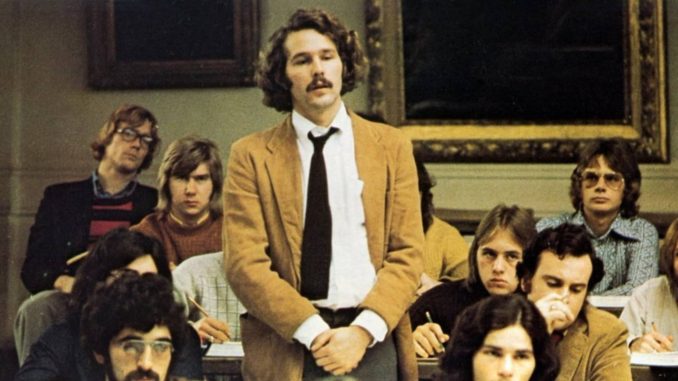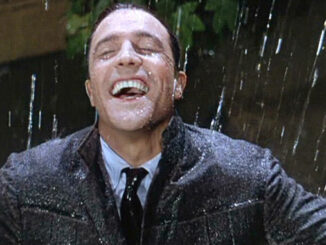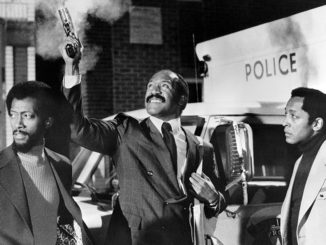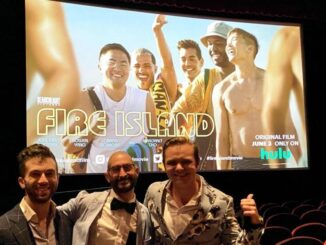
by Guy Phillippi
I grew up in a town…well, calling it a town is an overstatement. There was no “town”; it was 2,000 people sharing a zip code. There was no McDonald’s and the movie theatre was a drive-in that was only open four months every year.
Thus, movies weren’t an integral part of my youth. A movie was an occasional night out to be entertained–escapism and not missed if we didn’t go. At school, I worked for high grades and to impress my teachers. Then, as a young teen, I saw a film called The Paper Chase.
It was a well-acted story about Harvard Law School student James T. Hart (portrayed by Timothy Bottoms) and his attempt to impress Contracts Law Professor Charles W. Kingsfield, Jr. (an Academy Award-winning role played by John Houseman), and I saw a lot of myself in Hart…although I will admit I don’t remember anyone as good-looking as Lindsay Wagner, who played Kingsfield’s daughter Susan, giving me a second glance. In his first year at Harvard, Hart is sure the key to success is making an impression on Kingsfield. Susan argues against this, telling Hart he will never be anything more than a name and a face on a seating chart to her dad. Subplots deal with other first year law students, from the arrogance of Bell or the slide into depression that envelops Brooks, a student with a photographic memory.
Hart ultimately learns that Susan is right. To Kingsfield, Hart is merely another body in the tiered classroom. The lesson seemed to be that if you want a challenge, challenge yourself, don’t look to impress a professor. Hart learns that life is more than collecting pieces of paper. At the end of the movie, Bottoms folds his unseen grades into a paper airplane and tosses them into the ocean.
A good film can still make me consider perspectives I’d never given much thought to previously. The Paper Chase was the first movie experience that actually had such an effect on me.
To me, this was a revelation. The idea that if you’re not careful, life can turn into one big “paper chase” from birth certificate to death certificate, was something I had never considered. I decided to put this lesson to work. At school, only subjects that interested me now mattered. If I didn’t want to answer a question, I did as Hart does at the end of the movie and requested they ask someone else. That didn’t go over well with my teachers, but I did know enough to quickly curtail such behavior. My lack of application to some studies resulted in lower grades. Needless to say, my parents weren’t pleased.
In college, I was determined to learn, not just get grades. However, rather than be allowed to learn by trying and failing, even if it was just by not putting music under the credits of a video on how to use a Bunsen Burner, I was told “do it this way because everyone does.” Then there was the grad school professor who claimed interest in rock music wanes by age 30. I argued, but was told it was just a hard rule of life. I didn’t see this as having my mind molded á la Kingsfield, just the arrogance of a pompous fool. Of course, said pompous fool had the ability to downgrade me, but the “paper chase” remained of no interest. Like Hart, I didn’t open my final grades. Eventually, my mother did.
Of course, few authority figures react to rebellion the way Kingsfield does in The Paper Chase, inviting Hart to rejoin the class, seemingly pleased that a student has had an original thought. But the film did prove a valuable lesson as I began a career in TV and film. I realized that affecting an audience was as important as entertaining it. The Paper Chase may not be one of the greatest films of all time” but it is a good story with a message about life. There are laughs with Bell’s proclamation that his course outline is “better than the text book” and tragedy in Brooks’ attempt at suicide.
Movies and television are entertainment, but even entertainment can have a long-lasting effect. We don’t want fluff, but beating the audience over the head with a message also isn’t necessary. It’s the difference between Rick giving a nod after Victor asks the band leader to play “La Marseillaise” in Casablanca and Rick saying, “Let’s drown out those Nazi bastards!”
A good film can still make me consider perspectives I’d never given much thought to previously. The Paper Chase was the first movie experience that actually had such an effect on me. I don’t look for that experience in every project I evaluate, but I do look for something out of the ordinary: a good laugh, a good thrill, a character I’ve never met before. Much like Professor Kingsfield or James T. Hart.





